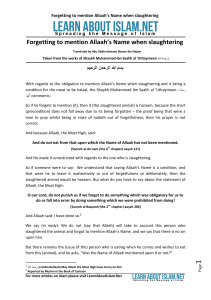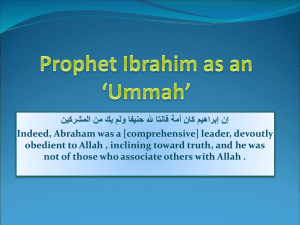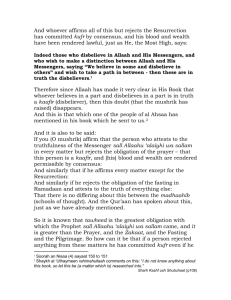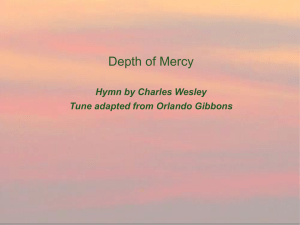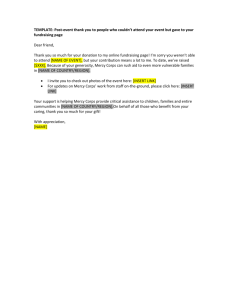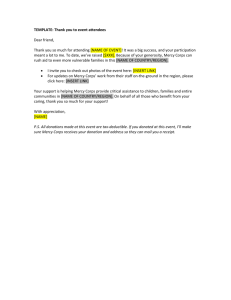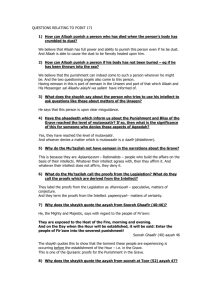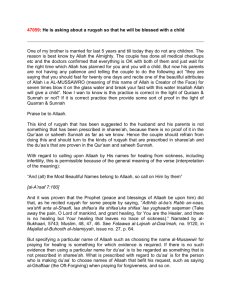U3Intro1Answers
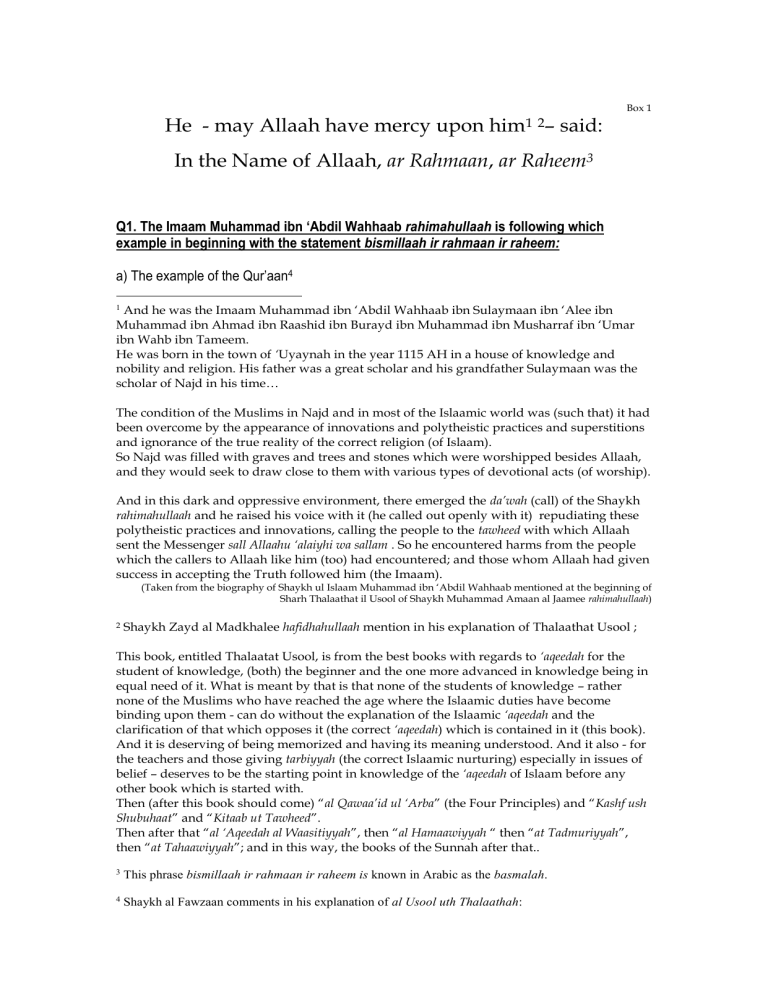
Box 1
He - may Allaah have mercy upon him
1 2
– said:
In the Name of Allaah, ar Rahmaan, ar Raheem
3
Q1. The Imaam Muhammad ibn ‘Abdil Wahhaab rahimahullaah is following which example in beginning with the statement bismillaah ir rahmaan ir raheem: a) The example of the Qur’aan 4
1 And he was the Imaam Muhammad ibn ‘Abdil Wahhaab ibn Sulaymaan ibn ‘Alee ibn
Muhammad ibn Ahmad ibn Raashid ibn Burayd ibn Muhammad ibn Musharraf ibn ‘Umar ibn Wahb ibn Tameem.
He was born in the town of ‘Uyaynah in the year 1115 AH in a house of knowledge and nobility and religion. His father was a great scholar and his grandfather Sulaymaan was the scholar of Najd in his time…
The condition of the Muslims in Najd and in most of the Islaamic world was (such that) it had been overcome by the appearance of innovations and polytheistic practices and superstitions and ignorance of the true reality of the correct religion (of Islaam).
So Najd was filled with graves and trees and stones which were worshipped besides Allaah, and they would seek to draw close to them with various types of devotional acts (of worship).
And in this dark and oppressive environment, there emerged the da’wah (call) of the Shaykh
rahimahullaah and he raised his voice with it (he called out openly with it) repudiating these polytheistic practices and innovations, calling the people to the tawheed with which Allaah sent the Messenger sall Allaahu ‘alaiyhi wa sallam . So he encountered harms from the people which the callers to Allaah like him (too) had encountered; and those whom Allaah had given success in accepting the Truth followed him (the Imaam).
(Taken from the biography of Shaykh ul Islaam Muhammad ibn ‘Abdil Wahhaab mentioned at the beginning of
Sharh Thalaathat il Usool of Shaykh Muhammad Amaan al Jaamee rahimahullaah)
2 Shaykh Zayd al Madkhalee hafidhahullaah mention in his explanation of Thalaathat Usool ;
This book, entitled Thalaatat Usool, is from the best books with regards to ‘aqeedah for the student of knowledge, (both) the beginner and the one more advanced in knowledge being in equal need of it. What is meant by that is that none of the students of knowledge – rather none of the Muslims who have reached the age where the Islaamic duties have become binding upon them - can do without the explanation of the Islaamic ‘aqeedah and the clarification of that which opposes it (the correct ‘aqeedah) which is contained in it (this book).
And it is deserving of being memorized and having its meaning understood. And it also - for the teachers and those giving tarbiyyah (the correct Islaamic nurturing) especially in issues of belief – deserves to be the starting point in knowledge of the ‘aqeedah of Islaam before any other book which is started with.
Then (after this book should come) “al Qawaa’id ul ‘Arba” (the Four Principles) and “Kashf ush
Shubuhaat” and “Kitaab ut Tawheed”.
Then after that “al ‘Aqeedah al Waasitiyyah”, then “al Hamaawiyyah “ then “at Tadmuriyyah”, then “at Tahaawiyyah”; and in this way, the books of the Sunnah after that..
3 This phrase bismillaah ir rahmaan ir raheem is known in Arabic as the basmalah .
4 Shaykh al Fawzaan comments in his explanation of al Usool uth Thalaathah :
b) The example of the Sunnah of the Messenger sall Allaahu ‘alaiyhi wa sallam 5 c) The example of the angels d) The example of the people of Paradise
Answer: a) and b)
Q2, Beginning with the basmalah was the example of which prophet from earlier times: a) Sulaymaan b) Moosaa c) Ibraaheem d) Aadam
‘alaiyhimussalaatu was salaam
Answer: a)
Q3. This previous prophet was writing to whom when he used the phrase bismillaah ir rahmaan ir raheem: 6 a) Daawood b) The people of Loot c) Fir’awn (Pharaoh) d) Bilqees
Answer: d)
Q4. The people who do not begin those things which they have authored with bismillaah
ir rahmaan ir raheem have done what: a) Left the Prophetic Sunnah b) Abandoned the example of the Book of Allaah c) Committed a major sin d) Committed an act of apostasy
This is the first thing that you see in the mus-haf (the written copy of the Qur’aan) and before every soorah from it – bismillaah ir rahmaan ir raheem (in the Name of Allaah, the Extremely Merciful, the
Bestower of Mercy.
5 Shaykh al Fawzaan comments in his explanation of al Usool uth Thalaathah :
He (the Prophet sall Allaahu ‘alaiyhi wa sallam) used to write it (the basmalah) at the start of his letters when he wrote to the governors and to the chiefs and to those who were in the different regions of the Earth, calling them to Islaam…
And he sall Allaahu ‘alaiyhi wa sallam used to begin his talks and his speech with “bismillaah ir rahmaan ir raheem”..
6 Allaah, the Most High, states:
She said: O chiefs! There has been delivered to me a noble letter.
It is from Sulaymaan and it reads:
Bismillaah ir rahmaan ir raheem.
Do not be haughty and refuse what I call you to but come to me in submission.
(Soorah an Naml (27) aayaat 29 to 31)
Answer: a) and b)
Q5, The consequences of not beginning that which a person has authored with
bismillaah ir rahmaan ir raheem may be: a) Entering the Hellfire c) Those writings be deprived of benefit d) Being punished in the Grave b) Those writings being deprived of blessing
Answer: b) and c)
Q6. The reason why a person might leave off beginning his writings with bismillaah ir
rahmaan ir raheem is because: a) He has an aversion to the Sunnah b) He is a mushrik (person of shirk) c) He has complete tawakkul (reliance) upon Allaah d) He blindly follows someone else who has an aversion to the Sunnah answer: a) and d)
Q7. A person ,when he begins with bismillaah ir rahmaan ir raheem, intends what? 7 a) I testify that there is none worthy of worship except Allaah, the Most Merciful, the Bestower of Mercy b) In the Name of Allaah, the Most Merciful, the Bestower of Mercy I live and I die c) I seek the aid through the Name of Allaah, the Most Merciful, the Bestower of Mercy d) I begin with the Name of Allaah, the Most Merciful, the Bestower of Mercy seeking blessing by doing so 8 answer: c) and d)
7 Shaykh Zayd al Madkhalee hafidhahullaah mention in his explanation of Thalaathat Usool :
.. bismillaah ir rahmaan ir raheem meaning: I begin this action of mine and my writing, seeking blessing in the Name of the Deity who alone is deserving of the right to be worshipped, to the exclusion of everything other than Him, the One who is described with the Attributes of
Perfection and Majesty – and from them is the Attribute of ar rahmah (Mercy) in the general sense and the Attribute of Mercy in the specific sense. The Attribute of Mercy in a general sense is that which is indicated by His statement, He the Most High: ar Rahmaan..
And the Attribute of Mercy specific to the believers is that which is indicated by His statement, He the Most High: ar Raheem..
8 Shaykh al Fawzaan comments in his explanation of al Usool uth Thalaathah :
So therefore it(the basmalah) is a tremendous preface for speech and for books and for letters – so a person seeks the aid of Allaah in their beginning and seeks blessing by means of His Name.
Box 2
Know - may Allaah have mercy upon you –
Q1. when the Imaam says, “Know”: a) he does so because he is assuming that the reader is ignorant of his own religion b) he does so because he is assuming that the reader will not pay attention unless he is given a command like this c) he does so because he wishes to draw attention to the importance of the topic he is about to discuss 9 d) this word is a command, with meaning of “learn!”
Answers: c) and d)
Q2) al ‘ilm (knowledge) is: a) To perceive something in accordance to how that thing actually is 10 b) Memorising many facts c) To conceive of something in accordance to how it is d) The opposite of al jahl (ignorance) 11
Answers: a) and d)
Q3) when the Imaam says, “May Allaah have mercy upon you”: 12 a) He does so to remind the readers that death is close to all of us b) He fears that the readers are people of sin, in great need of Allaah’s Mercy
9 Shaykh al Fawzaan comments in his explanation of al Usool uth Thalaathah :
When he says “know!” then its meaning is: the matter which he is going to put before you is an important matter ; so this word “know” indicates the importance of the topic which he is beginning with.
10 Shaykh al Fawzaan comments in his explanation of al Usool uth Thalaathah :
Al ‘ilm (knowledge) is to comprehend something as it actually is or to perceive something in accordance with how it actually is.
11 Shaykh al Fawzaan comments in his explanation of al Usool uth Thalaathah :
To comprehend something in a manner contrary to how it actually is in reality or to perceive something contrary to reality of it – this is al jahl (ignorance) and it is the opposite of al ‘ilm.
12 Shaykh Zayd al Madkhalee hafidhahullaah mention in his explanation of Thalaathat Usool :
(page 3)
Then he (the author) follows the tanbeeh (notification contained in the word “know”) with a supplication for every reader and for every listener. And (this) is the one of the manners of the scholars, those who give importance to the great affair of Islaam and of the Muslims and who love goodness for the person who seeks goodness, when he (the author) says: “may
Allaah have mercy upon you”.
c) He is making a du’aa (supplication) for the readers d) He does so out of fear that the readers will curse him if he does not say this
Answer: c)
Q4) when the Imaam begins with a good word such as, “May Allaah have mercy upon you” 13 : a) The student will be influenced by these good manners in a positive way b) That it will bring the student turn attentively to his teacher c) That it will prevent the student from being driven away from his teacher, such as would occur if the Imaam began with a harsh word instead d) That the student will blindly follow a teacher who begins his lesson in such a nice manner
Answers: a), b) and c)
Q5) the scholar and the person who is calling to Allaah and enjoining the good and forbidding the evil should: a) Call the people in a kind manner b) Turn a blind eye to the sins of the people c) Use gentle speech 14 d) Constantly emphasise Allaah’s Punishment and Wrath and Anger
Answers: a) and c)
Q6). when the scholars and callers are dealing with the hypocrites and people who stubbornly reject the Truth when it comes to them:
13 Shaykh Saalih ibn ‘Abdil ‘Azeez aale Shaykh hafidhahullaah mention in his explanation of
Thalaathat Usool about the statement “Know, may Allaah have mercy upon you”
And contained in this is talattuf (kindness), and it contains a notification that this knowledge is built upon kindness and upon mercy to the students – because it is a supplication for mercy for him..
The Messenger sall Allaahu ‘alaiyhi wa sallam said:
Ar Rahmaan (the Most Merciful) has mercy upon those who are merciful; have mercy upon those who are upon the Earth, the One who is above the Heaven will have mercy upon you.
The scholars said that the cause for this is that this knowledge is built upon mercy, and its result in this worldly life is mercy and its end outcome in the Hereafter is mercy. Therefore the Shaykh rahimahullaah drew attention to this in a kind and concise manner when he said:
Know – may Allah have mercy upon you
(this being) a supplication for mercy upon the student.
14 Shaykh al Fawzaan comments in his explanation of al Usool uth Thalaathah :
So it is obligatory upon the teacher and upon the one who calls to Allaah and upon the one who commands with the good and prohibits the evil that they be kind and gentle to the person they are addressing with supplication for them and through complimenting them and using mild speech, because this is more likely to bring about acceptance.
a) Then it is legislated to use sternness against them 15 b) That one of the intentions is: to cause the rest of the people to have aversion to these hypocrites and disbelievers c) That gentle words are used with them and gifts are given to them d) That they ask the Muslim rulers to wage war on these hypocrites and disbelievers
Answers: a) and b)
Q7). those people who stubbornly refuse to accept the Truth when it is presented to them: a) Should be given money and gifts until they accept the Truth b) Wish to misguide the rest of the people 16 c) Should be dealt with in the same manner as those who are unaware of the Truth d) Will definitely go to the Hellfire
Answers: b)
15 Shaykh al Fawzaan comments in his explanation of al Usool uth Thalaathah :
As for the mu’aanid (the one who stubbornly rejects the truth) and the one who mukaabir (the one who rejects it out of pride) then he is addressed in a different manner.
Allaah the Perfect says:
And do not debate with the People of the Book except in a way which is best – except with those of them who transgress.
And say “We truly believe in what was sent down to us and in what was sent down to you. Our
Lord whom we worship and your Lord is One and we are Muslims in submission to Him.
Soorah al ‘Ankaboot (29) aayah 46
So those who transgressed from the People of the Book and who obstinately refused the Truth and rejected the Truth with pride – then those people are not addressed “billatee hiya ahsan”(in the manner which is best) – rather they are addressed with that which will deter them.
He the Most High said:
O Prophet! Strive hard against the kuffaar and the hypocrites and be stern with them. And their
Final Abode is the Hellfire and what an evil destination.
Soorah at Tawbah (9) aayah 73
16 Shaykh al Fawzaan comments in his explanation of al Usool uth Thalaathah :
And He the Most High said about them (the hypocrites):
And admonish them with a saying that will have an effect upon them.
Soorah an Nisaa (4) aayah 63
There is a specific manner for addressing them because they are people who reject out of stubbornness and pride and do not want the Truth; rather they only wish to misguide the people.
